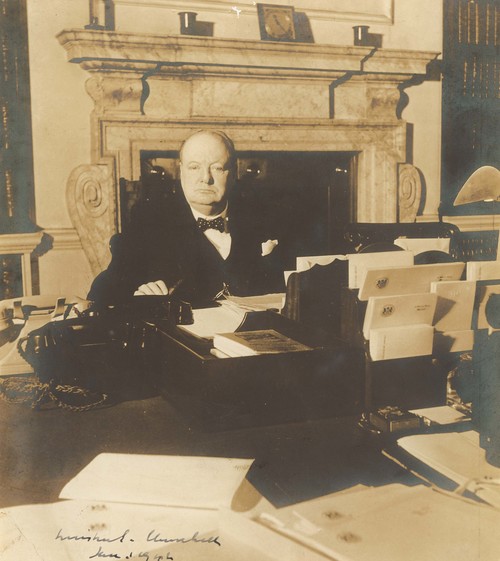
Auction: 17020 - Autographs, Historical Documents, Ephemera and Postal History
Lot: 963
Autographs
Winston Churchill
1942 (1 January) original studio silver print photograph by Cecil Beaton of Churchill, taken in the Prime Minister's study, 10 Downing Street, Whitehall, London in 1940, the year in which Churchill became Prime Minister.
An iconic and historic image signed and dated "Winston S. Churchill / Jan 1, 1942" in fountain pen ink during his momentous visit to Washington D.C. to meet with President Roosevelt.
One of the rarest wartime signed photographs of Churchill, 9 x 9 inches, in a mount 19 x 20 inches; slight crease to the lower left not detracting from the image. Photo
The very hour that the United States entered World War II, Winston Churchill decided to invite himself to Washington, D.C. On December 8, 1941, as Franklin D. Roosevelt was delivering his “day of infamy” speech to Congress, the British prime minister resolved to sail across the Atlantic to fortify his nation’s most important alliance. “We could review the whole war plan in light of reality and new facts,” an eager Winston Churchill wrote to Roosevelt. After expressing concern about Churchill’s safety in the U-boat-filled ocean—a concern the prime minister waved off—FDR assented. “Delighted to have you here at the White House,” the president replied.
Churchill, whose warship had just docked in Norfolk, Virginia after ten storm-tossed days at sea, was anxious to travel the 140 miles to Washington to see Roosevelt. They had met four months earlier, in Newfoundland, to draft the Atlantic Charter, a joint declaration of postwar goals, including self-government for all peoples. Both men had hoped it would convince the American people to join the war and ally with Britain, but public opinion in the U.S. did not change until Pearl Harbour.
Churchill and Roosevelt got on very well and ate lunch together every day. Churchill left for England on January 14, 1942, flying home via Bermuda. “His visit to the United States has marked a turning-point of the war,” enthused a Times editorial upon his return. “No praise can be too high for the far-sightedness and promptness of the decision to make it.” All those late nights took a toll on Roosevelt and his exhausted staff. But the bond between president and prime minister—the trust that would win the war—was forged. Roosevelt, in the now-quiet White House, found he missed Churchill’s company
This image of Churchill was taken by Cecil Beaton while serving as Official Photographer, Home Front, for the Ministry of Information.
Subject to 20% VAT on Buyer’s Premium. For more information please view Terms and Conditions for Buyers.
Estimate
£9,000 to £10,000




